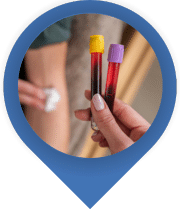The Latest Healthcare News
Check out our blog to learn more from our team about the latest medical advancements, health tips, and primary care news.

If you’re experiencing joint stiffness, achiness, and tenderness, you might be dealing with arthritis symptoms—a common condition that can affect anyone and is the leading cause of disability in the U.S. Arthritis can disrupt daily life, causing pain, limiting movement, and even impacting sleep, mood, and social independence. The compassionate primary care physicians at AllCare can diagnose your arthritis, identify what causes arthritis, and develop a personalized treatment plan to help relieve your pain and improve your quality of life.
According to the CDC, nearly 60 million people in the U.S. have arthritis, with most being over age 45. Arthritis can cause ongoing discomfort or flare-ups intermittently, with pain that may appear in one or multiple areas of the body. It can make everyday tasks like climbing stairs or opening jars difficult, and signs of arthritis often worsen at certain times or after specific activities. In some cases, the skin over affected joints may become swollen and red. While there is no cure for arthritis (can arthritis be cured), treatments such as physiotherapy, arthritis medication, and, in severe cases, surgery can slow its progression. An AllCare primary care physician can diagnose your condition and provide a personalized treatment plan to help improve your quality of life.

There are over 150 different types of arthritis, and the cause for some of them is unknown. In some cases, arthritis can be caused by disease, infection, genetic defect, injury, or overuse. Depending on the type of arthritis, it may affect other organs, including the eyes, heart, and skin.
Some of the most common forms of arthritis are:
In addition, there are other forms of arthritis or related diseases, including gout, lupus, scleroderma, and ankylosing spondylitis. To determine which type of arthritis you have, schedule an appointment with an AllCare primary care physician who can offer a proper arthritis diagnosis and specialized treatment plan.

One of our primary care physicians will review your medical history, discuss your arthritis symptoms, and perform a physical exam. We may also need to perform additional testing to determine what type of arthritis you have.

These tests will analyze various components of your blood, such as antinuclear antibodies, which attack healthy cells in your body; creatine levels to determine if you have kidney disease; sediment rate, which tests for inflammation; uric acid, which helps diagnose gout; and a complete blood count (CBC). By evaluating these, healthcare professionals can identify the type of arthritis and any underlying diseases that may contribute to your condition..

Depending on your type of arthritis and your pain level, an AllCare physician can request any number of arthritis medications that may offer relief, including: Nonsteroidal anti-inflammatory drugs (NSAIDs), like ibuprofen or acetaminophen, Corticosteroids work quickly to reduce inflammation and are good for short-term relief, Disease-Modifying Antirheumatic Drugs (DMARDs) can slow or stop the inflammation in your joints, and lastly, Opioids are used only in cases where the pain is severe and no other treatment has worked.

This type of test involves taking a small sample of synovial fluid to determine if crystals, bacteria, or viruses are present.

Depending on how advanced your arthritis is, we may recommend you see a physical therapist to help you regain your mobility and range of motion by strengthening your muscles and relieving pain. If your arthritis is severe, we can also refer you to a surgeon who will discuss your arthritis treatment options, including joint replacement.

Experience the convenience of telehealth appointments at AllCare. Our telemedicine services are designed to provide you with seamless access to healthcare without the need to leave your home. Whether you need an online doctor’s appointment for immediate or primary care, AllCare’s got you covered. With our online telehealth services currently available to individuals located in Virginia, Maryland, and Washington, D.C., you can connect with our experienced immediate and primary care physicians via secure video calls.
At AllCare, we are expanding our virtual healthcare access to all services previously offered in person. This includes:
We understand how uncomfortable and sometimes even debilitating arthritis can be. If you’re experiencing any signs of arthritis, it’s important to talk with our expert team who can determine the type of arthritis you are experiencing and provide a personalized treatment plan to help relieve your pain. Those who can benefit from AllCare arthritis treatments include:
We know that arthritis can be exhausting. That’s why the expert team at AllCare offers compassionate, comprehensive diagnoses and personalized treatment plans for arthritis, ensuring you get the care you need in an environment that’s comfortable and convenient.
While there is no one-size-fits-all treatment for arthritis, there are several treatments that can help ease some of your discomfort, including analgesics, medications, lifestyle changes, physical therapy, and even surgery. It’s best to talk with a physician to determine the best arthritis pain relief treatment for you.
if left untreated, some forms of advanced arthritis can eventually be life-threatening. But even if arthritis isn’t severe, it can disrupt your quality of life, especially if undiagnosed or untreated for long periods of time. That’s why it’s important to discuss your symptoms with your doctor and devise a treatment plan as soon as possible, especially if you have a form of inflammatory arthritis.
Yes. If you have arthritis, it’s important to keep exercising. Regular activity can help strengthen the muscles around your joints, which can support and protect them. Remember, it’s normal to feel sore at first, and it’s important to note that you’re not making your joints any worse, especially if you haven’t exercised in a while. While past sports injuries might increase the risk of osteoarthritis in a specific joint, it’s not caused by exercising too much.
As of today, there is no cure for arthritis, but with the proper treatment plan and lifestyle modifications, you can reduce the pain and discomfort associated with it. In addition, the Arthritis Society has funded scientists working toward permanent solutions that may one day give us a future without arthritis.
While your parents may have told you cracking your knuckles could cause arthritis, it’s more likely they were just annoyed by the noise. After all, there is no real evidence that knuckle cracking causes arthritis. If you feel pain when cracking your knuckles, you may have an abnormality in the structure of the joint, like loose cartilage or injured ligaments. Seek medical attention if you have severe pain or pain that doesn’t resolve after a day or two when cracking your knuckles.
At AllCare, we’re proud to deliver exceptional primary and immediate care to residents across Virginia, Maryland, and Washington D.C. From bustling city centers to serene suburban neighborhoods, our clinics are strategically placed for your convenience and care. Experience top-tier arthritis treatment in your community with AllCare, where your health is our priority.
Check out our blog to learn more from our team about the latest medical advancements, health tips, and primary care news.
Seasonal Affective Disorder (SAD) represents a significant mental health concern affecting approximately 5% of adults in the United States. This […]
Read More >Mammograms save lives. Early detection of breast cancer through proper screening will give a patient a remarkable 99% five-year survival […]
Read More >Most people are aware that diet, exercise, and genetics affect cholesterol levels. But can stress raise your cholesterol? The answer […]
Read More >Our related healthcare services extend beyond immediate care to include preventive care such as routine physical exams, chronic disease management for conditions like diabetes, and specialty care referrals for more complex health issues.